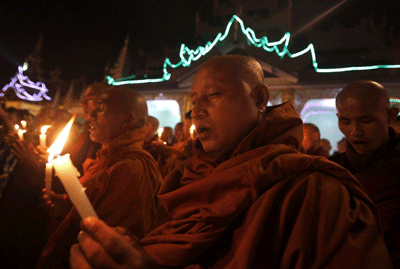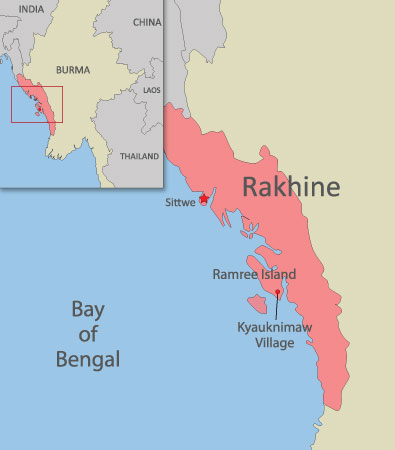




Burmese security forces shot dead an ethnic Rakhine and wounded two others on Tuesday as they opened fire when several thousand Buddhist Rakhines staged protests and moved to oust Muslim residents from a village, according to eyewitnesses.
The shooting at Kyauknimaw village in Ramree township came as the government strove to bring more than a week of communal clashes under control in troubled Rakhine state, amid U.N. warnings that the violence threatens to derail Burma's political reform process.
At least 84 people have died, 129 others have been wounded and 28,000 made homeless in the clashes between mostly Muslim Rohingyas and Rakhines, according to official figures.
Some 4,600 houses have also been burned down in the worst violence since June, when clashes left more than 80 dead and 75,000, mostly Rohingyas, displaced and now continuing to live in overcrowded camps.
With the new influx, the camps are being stretched beyond capacity in terms of space, shelter, and basic supplies such as food and water amid a lack of doctors to treat the sick and wounded, the United Nations refugee agency (UNHCR) warned Tuesday.
Gunfire


Illegal immigrants
Burma's 800,000 stateless Rohingyas, whom the United Nations considers among the world's most persecuted minorities, are seen by the government and by many Burmese as illegal immigrants from neighboring Bangladesh.
The Rohingyas bore the brunt of the June and latest violence.
But other Muslims, like the Karman group, have also been affected by the clashes.
In Maungdaw, the port town north of Rakhine's capital Sittwe, RFA reporters visited Rakhine and Rohingya refugee camps and villages and found the evacuees and villagers concerned over their security.
Rakhine refugees described the difficulties of camp life and their ongoing fear of attacks by Muslims.
Rohingyas said their main complaint is that, under the terms of martial law in the area, Rohingya movements are tightly restricted, making it difficult for them to go into town to obtain food.
Radical force
The 10-nation Association of Southeast Asian Nations (ASEAN), of which Burma is a member, warned this week that the Rohingya could turn into a radical force, calling for urgent regional attention to end the Rakhine crisis.
"The situation is deteriorating and there is now a risk of a radicalization of the Rohingya. This would not be good for anyone," ASEAN Secretary-General Surin Pitsuwan said. "This would have wider strategic and security implications for the region."
The UNHCR on Tuesday expressed alarm at the renewed violence, with spokesman Adrian Edwards saying, "It is clearly urgent that law and order be restored to prevent further violence, and that access is facilitated so that aid can be provided to those in need."
The UNHCR had joined an interagency visit to some of the violence-affected areas.
"We saw widespread destruction and displacement. Our staff noted that many of the internally displaced people are in extremely hard-to-reach areas," Edwards said in a statement.
Fleeing in boats
More than 3,000 people have fled in boats toward the state capital, Sittwe, to seek assistance in existing camps for internally displaced people, he said.
"It is estimated that another 6,000 people are stranded on boats or on islets along Myanmar's [Burma's] western coast. They are looking for safe access to places where they can receive assistance."
UNHCR meanwhile appealed to neighboring countries to keep their borders open for those people seeking safety from the unrest in Rakhine state.
"We stand ready to assist governments in addressing this evolving humanitarian emergency," Edwards said
Reported by RFA's Burmese service and Chris Billing. Translated by Win Naing. Written in English by Parameswaran Ponnudurai.